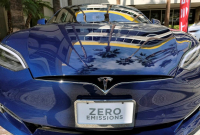Support strong Canadian climate journalism for 2025
A bold Quebec election promise to ban the sale of new gasoline-powered vehicles by 2030 is following the lead of countries such as France and the United Kingdom, says the province's left-leaning Québec solidaire party.
"Quebec must take big steps towards reducing its dependence on solo driving," said Ruba Ghazal, a QS candidate in the Montreal riding of Mercier.
"Québec solidaire commits to gradually get internal combustion engine vehicles off the roads while accelerating the deployment of an electric charging network of Hydro-Québec."
Ghazal was flanked by Québec solidaire spokesperson Manon Massé, and fellow candidate Sol Zanetti, the party's transport critic, for the announcement.
The promise was immediately criticized by the party's political rivals, but praised by environmental groups in both Quebec and Ontario.
According to Dale Marshall, national program manager of Toronto-based Environmental Defence Canada, QS’ pledge is a “great initiative that makes sense from a human health perspective, personal finance perspective, and climate change perspective.” He added that the province could benefit from smaller benchmarks on their journey to 2030 — “for example, 20 per cent electric in 2022 and then ratcheting it up over time.”
Heatwaves were 'just the trailer for the movie that's coming'
With the temperature in Montreal simmering at 28 C at 10:00 am, Massé told reporters in the city's La Fontaine Park that it was an appropriate day to discuss global warming.
“We need to limit global warming by 1.5 C, and if we do nothing, we will pass the point of no return by 2040. And that’s tomorrow morning, in my view,” Massé said. “We have just lived in the hottest July in history. And this summer’s heatwaves were just the trailer for the movie that's coming.”
The initial ban of gasoline-powered vehicles, would be followed by a ban on the sale of new hybrid vehicles in 2040, with the goal of eliminating all gas and hybrid vehicles from Quebec roads by 2050, the party's candidates explained.
“It’s like quitting smoking; we are going to do in in three steps,” said Ghazal, the QS candidate in the inner-city riding of Mercier. “On Jan. 1, 2050, the compulsive smoker will stub out its last cigarette: Quebec will have completed its transition.”
Mercier became the first riding in the province to send a QS member to Quebec's National Assembly. Amir Khadir was initially elected as a QS MNA in Mercier in the 2008 election. He was re-elected in 2012 and 2014, but is no longer seeking re-election when Quebecers go to the polls on Oct. 1.
QS is entering the campaign as the fourth largest party in the legislature, behind the governing Liberals, the centre-right Coalition Avenir Québec, and the sovereignist Parti Québécois. QS also supports independence for Quebec from Canada and is running its campaign with a slogan that touts its "popular ideas."
Massé said that the proposed ban on sales of gas-powered vehicles was all part of a plan to reduce greenhouse gas emissions by 48 per cent in 2030 and 95 per cent in 2050 when compared to levels recorded to 1990.
If elected, Québec solidaire also promises to boost spending on public transport infrastructure by $7.6 billion — to $13.3 billion in total — and slash the cost paid by Quebecers for public transit in half.
The party also intends to introduce new incentives for purchasing electric and hybrid vehicles, based on the type of vehicle and the buyers’ geographic location and income. It’s a system that will “help low-income earners,” explained Zanetti, who is running for the Montreal riding of Jean-Lesage.
France and Britain have committed to ban sales of diesel and gas cars by 2040, while India has set a goal for 30 per cent of its vehicles to be electric by 2030.

Massé’s political adversaries have slammed the idea.
Parti Québécois leader Jean-Francois Lisée told Radio-Canada that the QS promise was “too radical.”
“There are not enough electric vehicles today at dealers to meet demand, so it would be like punishing people for not buying something that is not available,” he said.
Meanwhille, Quebec Premier Philippe Couillard said that QS' plan was "punitive," The Canadian Press reported. The Quebec Liberal party leader added that he is "not at war with drivers. My plan is to instead convince them that buying an electric car is the best choice – and soon."
An electric vehicle mandate will quickly solve any supply issue, according to Marshall, from Environmental Defence. “Vehicle manufacturers have tons of models of the market that are affordable, they just aren’t building a lot of them […] An electric vehicle mandate is the policy driver to get cars on the road. Right now, auto manufacturers are reluctant to build them because they can make more money off SUVs and internal combustion engines.”
Sidney Ribaux, executive director of Équiterre, a Quebec-based environmental group, said QS “could have been more ambitious, but at least they put a date on it, and they are the first political party in Quebec to do that.”
“It sends a strong message to car manufacturers, consumers and municipalities that there’s an end date and it will help structure the market,” he said.
Quebec is the only jurisdiction in Canada to have a zero-emission vehicle law that was adopted unanimously by the Quebec National Assembly in 2016. The government later introduced regulations in 2017 that require 10 per cent of new vehicle sales to be low- or zero-emission by 2025.
It’s a figure Équiterre has asked all four parties to enhance. The current target of 10 per cent, said Ribaux, is “ridiculously low, given that jurisdictions like Norway are on their way to achieve 100 per cent electric vehicles the same year.”
“95 per cent of the needs of Canadians can be met by electric vehicles that are commercially available today. Not five years from now, but today. And in most provinces, those vehicles will cost you less to own and operate than a gas vehicle,” he said.
“Those are the facts today; but most people don’t understand those facts,” he added.
In Ottawa, the Trudeau government and the former Harper government have introduced regulations requiring auto manufacturers to reduce tailpipe emissions from new cars. The government is now working on a national strategy to make further progress by 2030. But it has not introduced any mandatory targets for electric vehicle sales or a zero emissions law.
Readers like you make coverage of Quebec’s election possible. Subscribe today, sign up for our free newsletter, or share this story with a friend.
Established in 2015, National Observer is an independent, online-only newspaper dedicated to investigating stories about climate change, energy and politics. In 2017, National Observer’s managing editor Mike De Souza won a Canadian Association of Journalists award for his investigation exposing a conflict of interest in the federal review of the Energy East pipeline project, which was subsequently terminated.
National Observer has an impact. Join us today and make more reporting possible.
Editor’s Note: This piece was updated at 4 p.m. E.T. on Aug. 31, 2018 to correct the spelling of Josie Desmarais, which was written as Jodie Desmarais. National Observer regrets the error.






Comments
I have just purchased a hybrid vehicle. I anticipate replacing it within 5 years with an EV.
Good for you! We replaced our gas car with an EV a couple of years ago.
The Federal Government are consulting on the current emission standards for 2022-2025 which are currently aligned with recently cancelled US EPA standards. They are weak compared with this Quebec Plan.
You can bet there is a lot of industry pressure to back off to align with the U.S. We should press the Feds not to do this.
Consultation is at https://www.canada.ca/en/environment-climate-change/services/canadian-e…
Massé said. “This summer’s heatwaves were just the trailer for the movie that's coming.” I think the movie has already started.